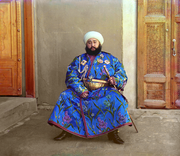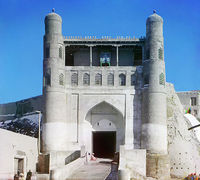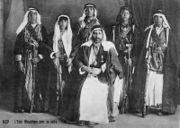Emir

Emir (Arabic: أمير; amīr, female: أميرة; emira; amīrah), ("commander" or "general", also "prince" ; also transliterated as amir, aamir or ameer) is a high title of nobility or office, used throughout the Muslim world, as well as historically in 19th-century Afghanistan and in the medieval Muslim world. Amirs are usually considered high-ranking sheikhs, but in monarchical states the term is also used for princes, with "Emirate" being analogous to principality in this sense.
(Ah-mare) The word is also used as a name (rather than an honorific) in Bosnia and Herzegovina, Iran and Turkey. While emir is the predominant spelling in English and many other languages (for example, United Arab Emirates), amir, closer to the original Arabic, is more common for its numerous compounds (e.g., admiral) and in individual names. Spelling thus differs depending on the sources consulted.
Contents |
Origins
Amir, meaning "chieftain" or "commander", is derived from the Arabic root '-m-r, "command". Originally simply meaning commander or leader, usually in reference to a group of people, it came to be used as a title of governors or rulers, usually in smaller states, and in modern Arabic usually renders the English word "prince." The word entered English in 1593, from the French émir.[1] It was one of the titles or names of the Islamic prophet Muhammad.
Princely, ministerial and noble titles

- The caliphs first used the title Amir al-Muminin ("Commander of the Faithful"), stressing their leadership over all Islam, especially in the military form of jihad; both this command and the title have been assumed by various other Muslim rulers, including sultans and emirs. For Shiite Muslims, they still give this title to the Caliph Ali as Amir al Muminin.
- The Abbasid (in theory still universal) Caliph Ar-Radi created the post of Amir al-Umara ("Amir of the Amirs") for his – in fact governing – Wazir (chief minister) Ibn Raik; the title was used in various Islamic monarchies; see below for military use
- In Lebanon, the ruling Emir formally used the style al-Amir al-Hakim since, specifying it was still a ruler's title. Note that the title was held by Christians as well.
- The word emir is also used less formally for leaders in certain contexts. For example, the leader of a group of pilgrims to Mecca is called an emir hadji, a title sometimes used by ruling princes (as a mark of Muslim piety) which is sometimes awarded in their name. Where an adjectival form is necessary, "emiral" suffices.
- Amirzade, the son (hence the Persian patronymic suffix -zade) of a prince, hence the Persian princely title Mirza.
- In Nigeria, the traditional rulers of the predominantly Muslim northern regions are known as Emirs.
- The temporal leader of the Yazidi people is known as an emir, or prince.
Military ranks and titles

From the start, Emir has been a military title, roughly meaning "general" or "commander."
The Western naval rank "admiral" comes from the Arabic naval title amir al-bahr, general at sea, which has been used for naval commanders and occasionally the Ministers of Marine.
In certain decimally-organized Muslim armies, Amir was an officer rank. For example, in Mughal India Amirs commanded 1000 horsemen (divided into ten units, each under a Sipah salar), ten of them under one Malik. In the imperial army of Qajar Persia:
- Amir-i-Nuyan,
- Amir Panj, "Commander of 5,000"
- Amir-i-Tuman, "Commander of 10,000"
- Amir ul-Umara, "Amir of Amirs" (cfr. supra) or 'Commander of Commanders'
In the former Kingdom of Afghanistan, Amir-i-Kabir was a title meaning "great prince" or "great commander."
Other uses
- Amir-i-Il designates the head of an Il (tribe) in imperial Persia.
- In addition to being an Arabic name, Amir is also a common Muslim male name for both Arab and non-Arab Muslims, taken from Arabic just as the Western name Rex ("king") is borrowed from Latin while Amira is a common Muslim female name. In Bosnia and Herzegovina, the female name Emira, often interpreted as "princess", is a derivative of the male name Emir.
See also
- Murabitun
Specific emirates of note


- List of emirs of Harar
- List of emirs of Kuwait
- List of emirs of Qatar
- Emirs d'Armènia ca:Categoria:Emirs d'Armènia
Famous people having Emir as a first name
- Amir Catic - a Bosnian Austrian boy. (Son of an Emir)
- Amir Slama
- Emir Kusturica
- Emir Halilovic
- Amir Khan (boxer)
Islamic titles
- Amir al-Muminin
- Bey
- Caliph
- Mahdi
- Mir, itself used in various compounds
- Mirza, literally "son of an Emir"
- Sheikh
- Sayyid
- Sultan
- Umrao
Emirs in fiction
- Abdul Abulbul Amir character & song
- Abul Qasim Qannadi, character in Margaret Weis and Tracy Hickman's Rose of the Prophet trilogy.
- Emir Wat Tambor was a character from Star Wars
- In an episode of Gargoyles called Grief, the Emir of Egypt summoned Anubis (Tony Jay) to resurrect his dead son.
Notes
- ↑ http://www.etymonline.com/index.php?search=amir&searchmode=none EtymologyOnLine
References
- WorldStatesmen Religious Organisations - see also many present Muslim countries